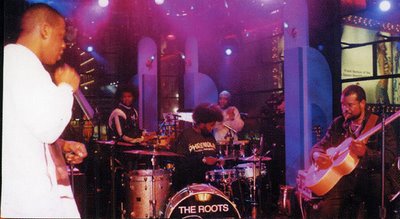Selling out: It's the right thing to do
I was watching the Coca Cola commercial with the jingle penned by Jack White (above) the other day, and I was thinking that's probably better than 80% of the music that ends up in the mainstream. Admittedly, I don't listen to Top 40 so I wouldn't really know and even if I did, that's not really saying much. But it's worth noting because unlike the 2006 releases we expect to be better than the mainstream - say, Ghostface or Jenny Lewis - Jack White's making money on this one. Boatloads (or canoeloads, if you will).
Of course, if you're singing in a commercial, one would hope you're making bank. Still, this isn't like Michael Jackson's Pepsi commercial where he retrofitted a song about an adulterous relationship into a kid-friendly corporate anthem (shouldn't have written "kid-friendly" and "Michael Jackson" in the same sentence, seriously -ed.). Nor is this what Moby did with Play, licensing songs that simply sounded good as background music (we'll get back to him later). There's no explicit advertising message and this isn't Coke latching onto a White Stripes song - this is Jack White and Coca Cola finding an intersection and creating something that belongs equally to both of them (and this itself isn't novel either - there's that adidas commercial Karen O sang on).
Selling out? Sure, though I don't think it's necessarily a bad thing. Yeah, the song is essentially an update of the iconic 70s "Hilltop" commercial, but for better or worse, commercials are part of our culture and you don't get mo' Americana than "Hilltop".
Disclosure: my job can involve taking your favorite, previously unsullied band and tainting them with the pox of commerce, so take my opinions however you will.
Plus, it's not like artists who don't do commercials don't make compromises anyway. For a musician like Jack White, he'd probably have to make more artistic sacrifices to record for a major label and get radio airplay than for an advertiser, who just wants shit to sound good.
Look at Moby - if he wanted to get radio spins and promotional push from retailers, the conventional way of breaking into the charts, he would have had to wedge his music into a format and recorded a "single" that may not have fit in with the rest of the album. Instead, he put every song from Play up for sale, got the exposure he needed for platinum sales and got paid enough to open a vegan tea shop on the Lower East Side.
 Sure beats being Liz Phair. She recorded a more radio-friendly album to feed her daughter after being told by her label that her original album was only "Goldish", only to see her sales tank anyway.
Sure beats being Liz Phair. She recorded a more radio-friendly album to feed her daughter after being told by her label that her original album was only "Goldish", only to see her sales tank anyway. This isn't to say writing commercial jingles is the new paradigm for artists. You still have to write albums to be taken seriously, and this Coke commercial wouldn't be relevant if the White Stripes didn't have a catalog of albums under their belt.
(Please excuse me for yet another tangent, but this is where Gnarls Barkley's true test will be - I think St. Elsewhere isn't bad and they're certainly hot hot hot, but there's a huge drop off in catchiness from "Crazy" and "Smiley Faces" to the rest of the album.)
What I do see is a possible shift from making music that sells to making music that brands. No one expects people to suddenly rush out to the stores and buy 6-packs of Coke upon seeing the Jack White music video/commercial. But in a field where there is no real differentiation between competitors, it's all about how the consumer feels about the brand, not the product. The product has to move still, but that's just the final, relatively minor step. Jack White simply makes music that gives the brand personality, rather than actually tell people how great tasting Coke is.

Something similar is at work over at Def Jam. Jay-Z has created an odd universe where flavors of the day like Young Jeezy and Ne-Yo coexist with critical faves (but not so profitable) Ghostface Killah and The Roots. Byron Crawford has criticized Jay-Z for the amount the label's spending on loss leader artists like The Roots, but he's missing the point (actually, I don't think Bol's missing the point - on most subjects, he understands more than he lets on, but prefers to take a controversial position). Jeezy and Ne-Yo move units. Ghostface and the Roots brand Def Jam.
Def Jam could be just another Interscope, a label that puts out the hits. But unlike Interscope, Def Jam has a cultural cache to preserve and exploit. Essentially, the platinum artists finance the less profitable artists who give Def Jam a brand identity. In turn, the "quality" artists lend credibility to those who aren't critics' darlings. It's a symbiotic relationship - you don't have to sell if you can brand. If you can contribute to the bottom line, even indirectly, that's enough.
And that's what Jack White's doing here - the cultural cache he's built through the White Stripes albums lets him make money with this commercial, which in turn lets him take creative risks with the Stripes and take on projects like the Raconteurs.
When you get down to it, the simple act of putting tickets or records on sale is selling out. Anything beyond that is a matter of degrees. And does anyone really give a fuck that Michaelangelo basically painted ads for the Vatican or that Da Vinci was a whore to the Medici clan? Sometimes, selling out is the path to artistic integrity.
Also, commenters on The Modern Age are fucking idiots.
tags: Jack White advertising music Def Jam


